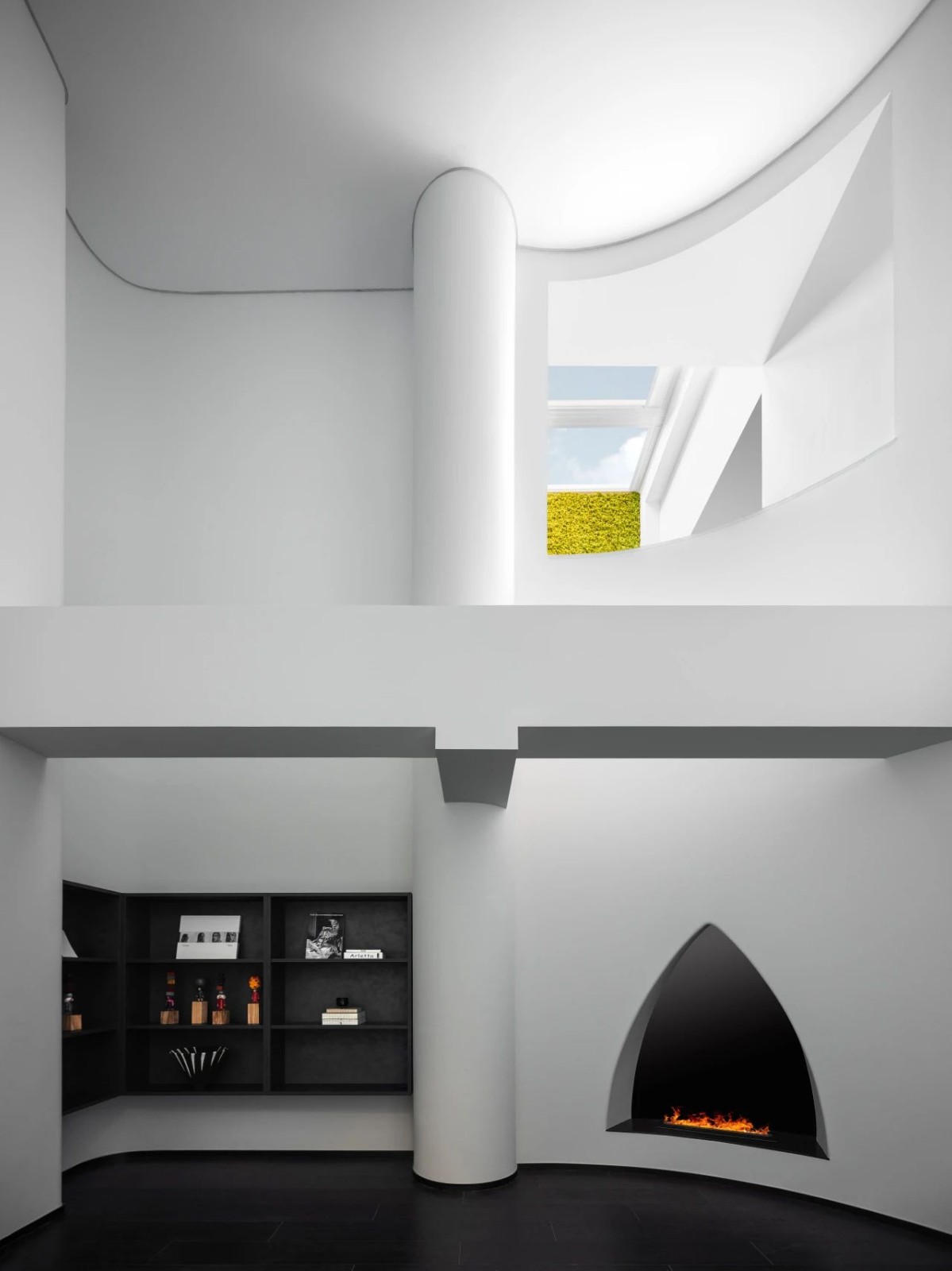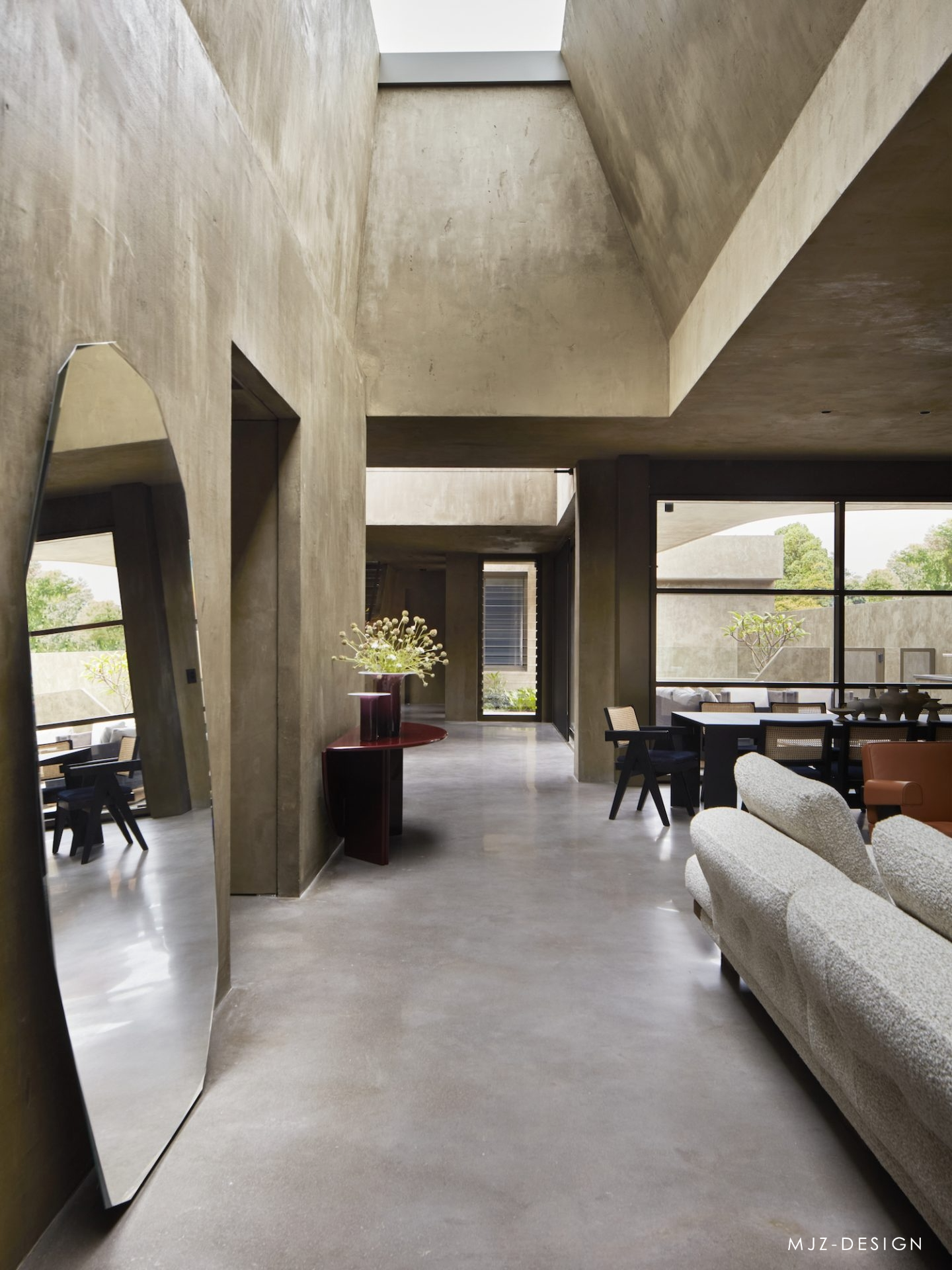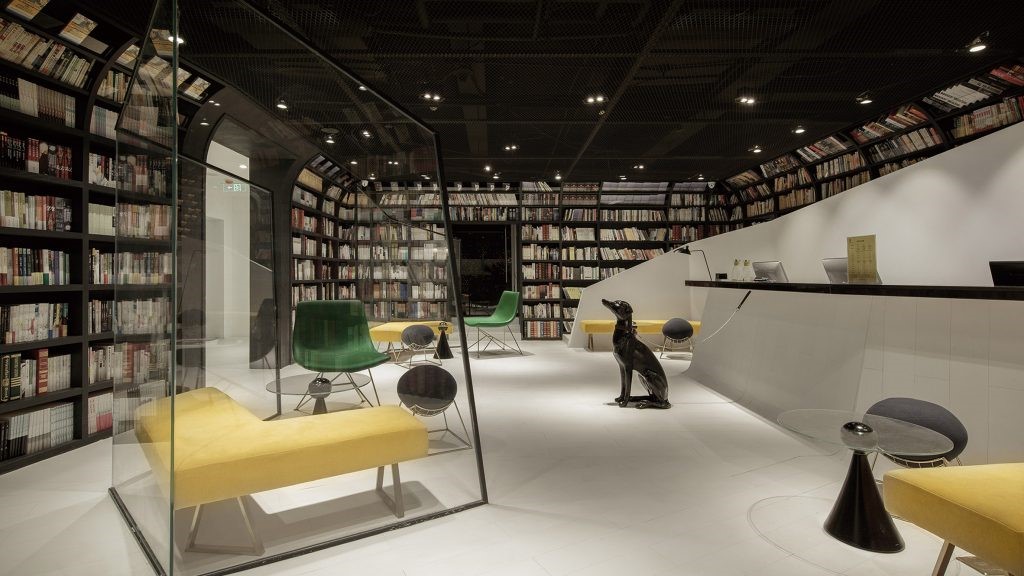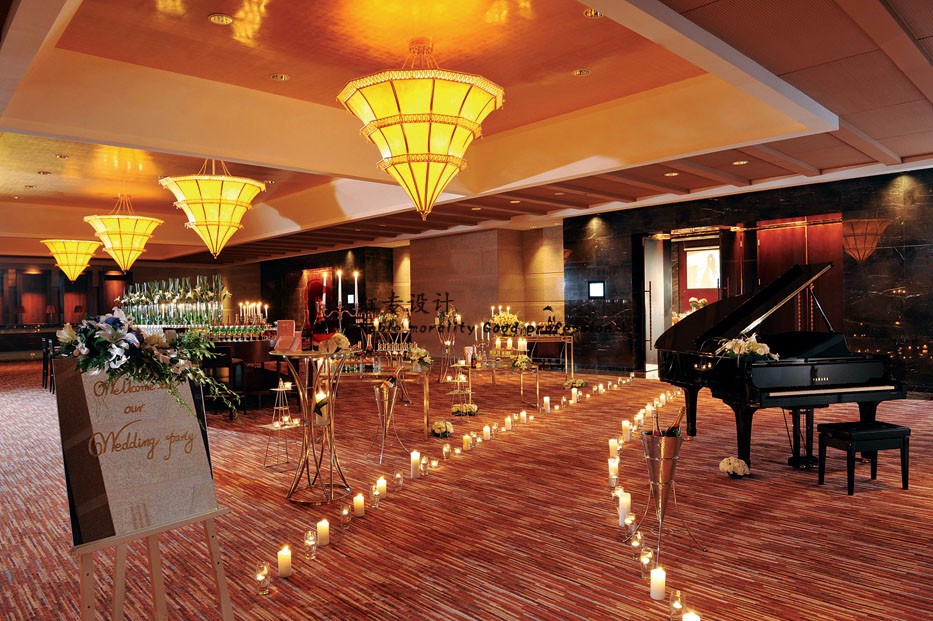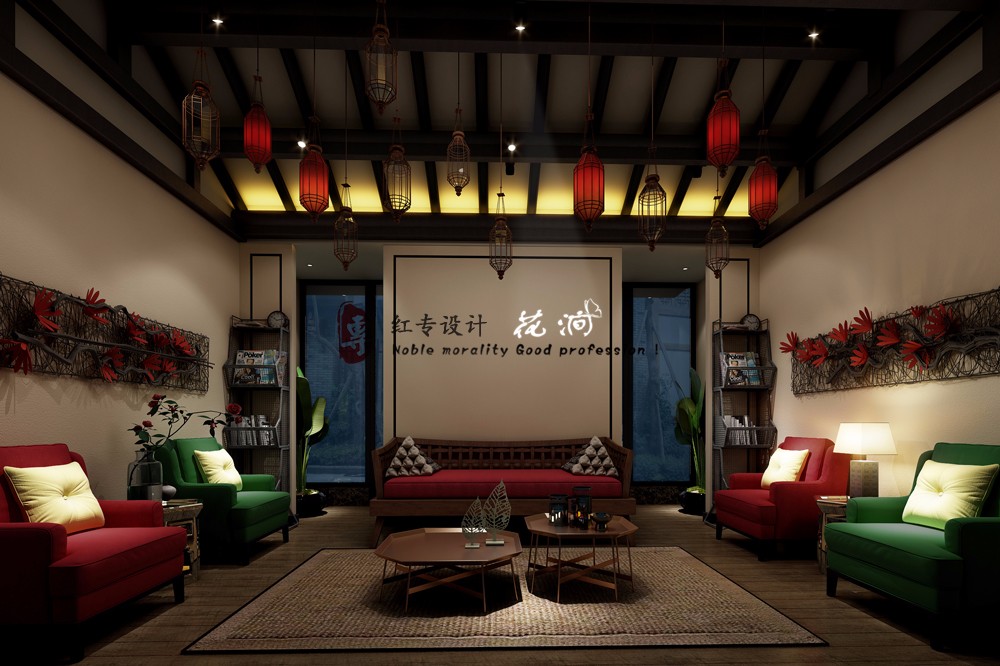新作丨 ADD加设计 · 成都青堂酒店 首
2021-08-13 09:37
那时不会知道是在梦里。 At that time, he wouldn’t have known that he was in a dream .
杜甫在安史之乱第四年流亡成都,寒冬躬身破庙。次年,在严武和王司马的帮助下修建了一座草堂居住下来。
Du Fu went into exile in Chengdu in the fourth year of the An-Shi Rebellion and spent the cold winter in a broken temple. The following year, with the help of Yan Wu and Wang Sima, he built a cottage to live in.
草堂修在成都西郊桤林深处,浣花溪畔。堂内烛火摇曳,竹林青影里隐有几声虫鸣,月亮藏在溪底粼粼闪动。
The hall was built deep in the alder forest in the western suburbs of Chengdu, on the banks of the Huan Hua River. In the hall, candles wavered, a few insects chirped in the green shadows of the bamboo forest, and the moon shimmered at the bottom of the stream.
结束一番诗酒会友,杜甫合上院门,阖眼月下倚坐。当晚的酒香混着白茅草的香气,有些随风,有些入梦。
After finishing his poetry, wine and chess, Du Fu closed the door and sat under the moon listening to the wind rise. The fragrance of wine that night was mixed with the aroma of white thatch, some with the wind, some into the dream.
成都青堂酒店以杜甫草堂为名,拥有酒店及公寓客房253间,集休闲、娱乐、餐饮、康体、会议等功能于一身。酒店坐落在成都春熙路步行街上,与春熙坊隔街相望,紧邻太古里,大慈寺。
Chengdu Qingtang Hotel, named after Du Fu Cao Tang, has 253 hotel and apartment rooms, combining leisure, entertainment, catering, recreation and conference functions. The hotel is located on the pedestrian of Chunxi Road, across the street from Chunxi Square and next to Taikoo Li and Daci Temple.
作为最古老的商业街道之一,如今的春熙路依旧热闹非凡,串起了正科甲巷、署袜中街等形成了城中最旺的商圈。依旧悠然婉转的古意时光下,藏着许多挖掘不完的趣人、趣物、趣店,青青老老,过去活在现在的胸膛,新的长在旧的血肉上。
As one of the oldest commercial streets, Chunxi Road is still bustling with activity today, stringing together Zhengkejia Lane, Department of Socks Central Street, etc. To form the most prosperous shopping district in the city. Under the still leisurely and gentle ancient time, there are many interesting people, things and stores hidden in the endless excavation.
千年斗转星移,青砖汉瓦石板古巷,在新与旧的更迭中,努力为历史留下痕迹。这些新旧并立的风景,便是成都这座以包容著名的城市,最迷人的姿态。
Thousands of years of stars, green bricks and Chinese tiles, stone slabs of ancient lanes, in the new and old turnover, efforts to leave traces of history. These old and new landscapes are the most charming gestures of Chengdu, a city famous for its tolerance.
当夜幕降临,城市开启梦神摩耳甫斯的通道,涌动出一种异样的熟悉感,裹挟着迷幻的不可置信发出“此刻究竟在哪?”的疑问。
When night falls, the city opens the channel of Morpheus, the god of dreams, and a strange sense of familiarity emerges, wrapped in a psychedelic incredulity that asks Where exactly is this moment?
心理学家卡尔·荣格将没有经历过的事情或场景仿佛在某时某地发生过的似曾相识之感称为“来自久远的已知”。荣格在他的书中提出一个科幻浪漫的观点,他认为这是前世今生的一种记忆,这种现象能够证明存在人类集体记忆,一些远古的记忆碎片被一代又一代的人类传承了下来。
The psychologist Carl Jung called the sense of déjà vu, in which something or a scene that has not been experienced before seems to have happened at a certain time and place, from the long-known. In his book, Jung proposed a sci-fi romantic idea that this is a memory of past lives, a phenomenon that proves the existence of collective human memory, some fragments of ancient memories that have been passed down from generation to generation.
脚下大地孕育出的自然景观与文化,连同人们过往经历和感受产生集体记忆。场所像一把钥匙,于某个时刻激发储存在脑海中的情景碎片,引起似曾相识的既视感。
The natural landscape and culture nurtured by the earth beneath our feet, together with peoples past experiences and feelings, generate collective memories. The place is like a key that at a certain moment stimulates the fragments of scenes stored in the mind, causing a sense of déjà vu.
土壤、气候、物种。木构、窗柩、花砖。如同杜甫之于草堂,人对场所的认同和想象一点一滴形成,是一种缓慢的力量,一旦形成又构成稳定的场所精神,反哺灵魂。
Soil, climate, species. Wooden structures, window caskets, flower tiles. Like Du Fus Cao Tang, the identification and imagination of place are formed little by little, a slow force, and once formed, they form a stable spirit of place that feeds the soul.
就像一部电影的诞生,哪怕最深处隐藏着隐秘的故事,或虚假的线索,也依旧犹如一幅幅离奇的迷画:凡可以“想像”都可以“梦见”。
Just like the birth of a movie, even if there are hidden stories or false clues in the deepest part of the film, it is still like a bizarre maze: everything that can be imagined and dreamed.
酒店的设计回应着这片土壤上生长已久的文脉。几千年来,成都这座古老的城市被群山包裹,气候湿热。为适应气候,民居空间结构开放通透,弱化室内与室外,建筑与自然的绝对界限。
The design of the hotel responds to the long-established cultural lineage of the soil. For thousands of years, the ancient city of Chengdu has been surrounded by mountains and a hot and humid climate. In order to adapt to the climate, the spatial structure of the residence is open and transparent, weakening the absolute boundary between indoor and outdoor, architecture and nature.
盆地日照不足,采光的述求也反映在民居建筑的围护界面,格栅门窗以及屋顶的老虎窗均为了引入室外光线。
The lack of sunlight in the basin is also reflected in the enclosure of the residential buildings, with grille windows and doors and tiger-shaped windows on the roof to bring in outdoor light.
民居间构成街道,片段组成场景,围墙的漆料、宅子的转角、楼梯的台阶、窗柩的花格,在街巷之中弥漫着烟火谱写着民谣。
The paint of the walls, the corners of the houses, the steps of the staircases, and the lattice of the window binders are the folk songs written by the smoke and fire in the streets and alleys.
转过一个个的街角,索性在交叉缠绕的巷子里迷失方向,走、停、打量,就像翻阅写满字迹的纸页。
Turning one corner after another, simply lost in the cross-twisted alleys, walking, stopping and surveying, like flipping through pages filled with handwriting.
透过一方窗格,这座一半烟火一半阑珊的城市似曾相识,慢慢在混沌中恢复了秩序,唤醒了来自久远的已知。
Through a windowpane, the city, half smoky and half faded, looks familiar, slowly regaining order in the chaos and awakening the known from a long time ago.
餐厅位于酒店负一层地下空间。餐厅以兼并创新的方式融入当地餐饮文化,结合传统川菜的经典烹饪技法,诠释逸乐优雅的饮食文化。
The restaurant is located on the first floor of the hotel. It integrates local dining culture in an eclectic and innovative way, combining the classic cooking techniques of traditional Sichuan cuisine to interpret the elegant food culture.
蜀地美食丰富,文人入蜀,闻香而至,杜甫巧烹五柳鱼,李白醉创太白鸭。川菜的取名婉转含蓄,古朴风雅,颇能抒发食客思古幽情。
Sichuan cuisine is rich, literati came to Sichuan to smell the fragrance, Du Fu skillfully cooked Wuliu fish, Li Bai drunkenly created Tai Bai duck. The name of Sichuan cuisine is subtle, simple and elegant, which can express the ancient feelings of diners.
餐厅的设计基于人们对蜀地饮食文化的认同,麻、辣、炽、红,味觉、视觉、听觉、触觉形成调取记忆的“索引”,将个人回忆与集体记忆中的场所与文化重构成安逸闲乐的餐饮空间。
The design of the restaurant is based on peoples identification with the food culture of Sichuan, which is numb, spicy, blazing and red, with the senses of taste, sight, hearing and touch forming an index for memory retrieval, reconstructing personal memories and collective memory of places and cultures into a comfortable and leisurely dining space.
杜甫草堂和武侯祠的红墙夹道,竹影婆娑是独属成都历史的浪漫情怀。透过窗口望向竹林围墙,餐厅藉由抽象的语言描写营造出巷陌灯火阑珊的蜀地市井。
The red walls of Du Fu Cao Tang and Wuhou Temple, with bamboo shadows, are the romantic sentiments unique to Chengdus history. Looking through the window to the bamboo wall, the restaurant creates the abstract linguistic depiction of the lanes and lights of the city of Chengdu.
川菜以辣除湿顺应自然,在尊重自然的同时大幅度调动味觉神经。设计于内外、冷暖、人造与自然之间寻求对立与平和。
Sichuan cuisine is spicy and humid and responsive to nature, respecting nature while significantly engaging the taste nerves. The design seeks opposition and peace between inside and outside, warm and cold, man-made and nature.
取中庸和谐之道,实现“平衡”和“中和”,应和蜀地以调和为主的口味,有如麻和辣、酸和甜,鲜少有一种口味的菜肴,多是两种口味的组合。
It takes the middle way and harmonious way to achieve balance and neutralization, which is in line with the harmony-based taste of Shu, such as hemp and spicy, sour and sweet, and rarely has one taste of dishes, but mostly a combination of two tastes.
“兼包并蓄、婉约热情”,巴蜀的处世态度与自然历史环境息息相关。在历史发展中,巴蜀地区多次大规模移民带入外来饮食习惯和烹调方法,大量移民文化的涌入改变了原有的城市社会结构,丰富滋养了当地的地域文化和人文精神。
Eclectic, ebullient and passionate, the attitude of Shu is closely related to the natural and historical environment. During the historical development, many large-scale immigrants brought in foreign food habits and cooking methods to the Bashu area, and the influx of a large number of immigrant cultures changed the original urban social structure and enriched and nourished the local regional culture and humanistic spirit.
原建筑地下空间封闭黯淡,为解决商业空间利用率问题,餐厅布置于负一层。将建筑下挖形成采光天井和户外院落,为餐厅引入自然光线,同时也将阴晴变化的心境引入到空间,阳光进来,雨也下来。
In order to solve the problem of commercial space utilization, the restaurant is arranged on the basement floor. The building is dug down to form a light patio and outdoor courtyard, bringing in natural light for the restaurant, and at the same time introducing the changing mood of sunshine and rain into the space.
采光中庭充当过渡空间,连接步行街与餐厅,串起闹市与隐逸。拾级而下,步入偏安一隅。阶梯反转,扭转现实与梦境。
The lighted atrium acts as a transition space, connecting the pedestrian street and the restaurant, linking the downtown and the seclusion. The staircase steps down into a remote corner. The staircase reverses, reversing reality and dreams.
明媚从空中洒落,带来了鲜亮的光,与角落深处的阴翳形成优雅的平衡,幽静深邃不动声色。
Brightness spills from the sky, bringing bright light, elegantly balancing with the shadows deep in the corner, quiet and deep.
漂浮于白茅草屋顶的云朵投下自然的温柔,影影绰绰,美好的梦境里留下飞鸟掠过的痕迹。
The clouds floating on the white thatched roofs cast a natural tenderness and shadows, leaving traces of birds passing by in a beautiful dream world.
人们提到杜甫时尽可以忽略了杜甫的生地和死地,却总忘不了成都的草堂。杜甫与草堂之间的关系充满意义,彼此相互渗透紧密影响。
When people mention Du Fu, they can ignore the place where he was born and where he died, but they cant forget the Cao Tang in Chengdu. The relationship between Du Fu and the Cao Tang is full of meaning and they are closely influenced by each other.
在成都的日子里,诗人一改从前沉重的诗风,著了不少田园诗记录着安逸宁静的草堂生活。诗歌中的杜甫反复确认自我与环境的关系、辨认秩序、从心底唤起记忆和认同,并不断的在空间、声音、温度、光线以及自我表达中获得归属感。
At Chengdu, the poet changed his poetic style and composed many idyllic poems to record the peaceful and quiet life of the Cao Tang. In his poems, Du Fu repeatedly confirms the relationship between himself and the environment, identifies order, evokes memory and identity from his heart, and constantly gains a sense of belonging in space, sound, temperature, light, and self-expression.
离开成都,杜甫南下漂泊,穷困凄苦、食不果腹,望着高悬的天,当回想起草堂安稳惬意的美好生活,恍惚失神分辨不出当下与过往,哪个才是梦境。
After leaving Chengdu, Du Fu wanders south, poor and miserable, unable to feed himself, looking at the sky and recalling the peaceful and comfortable life in Cao Tang, lost in a trance, unable to distinguish between the present and the past, which one is the dream world.
记忆中的美好组成了每个渴望被美好供养和指引的我们,哪怕事物本身不得不灭,抽象的美好之态却会被我们吸纳入心,美好用以人为载体的方式永存着。流星坠为陨石,彩虹化作蒸汽,诗歌中的草堂一次次毁灭,又一次次建起。
Even if the things themselves have to be extinguished, the abstract state of beauty will be absorbed into our hearts, and the beauty will live forever in the form of human carriers. Meteors fall into meteorites, rainbows turn into steam, and the halls of grass in poetry are destroyed and built up again and again.
“就像大海和天空在水平线上融合在一起那样,梦幻与现实也有可能正在遥远的地方相融合。”
Just as the sea and the sky merge on the horizontal line, so dream and reality may be merging somehow in a distant place.
李想先生,加设计有限公司创始人及总设计师,擅长将物理环境转变为感官体验,在人、空间、物质之间建立情感联系。对每个项目都保持好奇心,在文化、艺术、美学之间寻找可能性,突破固有格局,打造完整、永恒的空间。李想先生先后为希尔顿,文华东方,洲际,温德姆,丽笙,锦江等10多个国际酒店管理集团旗下的20多个国际品牌提供设计服务,帮助众多项目获得独一无二的空间体验。并带领团队在众多国际奖项中屡获殊荣,享有盛誉。
采集分享
 举报
举报
别默默的看了,快登录帮我评论一下吧!:)
注册
登录
更多评论
相关文章
-

描边风设计中,最容易犯的8种问题分析
2018年走过了四分之一,LOGO设计趋势也清晰了LOGO设计
-

描边风设计中,最容易犯的8种问题分析
2018年走过了四分之一,LOGO设计趋势也清晰了LOGO设计
-

描边风设计中,最容易犯的8种问题分析
2018年走过了四分之一,LOGO设计趋势也清晰了LOGO设计



















































































































